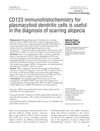 November 2023 in “International Journal of Advanced Research in Science, Communication and Technology”
November 2023 in “International Journal of Advanced Research in Science, Communication and Technology” The herbal hair oil was more effective at reducing hair fall than coconut oil.
 September 1997 in “JEADV. Journal of the European Academy of Dermatology and Venereology/Journal of the European Academy of Dermatology and Venereology”
September 1997 in “JEADV. Journal of the European Academy of Dermatology and Venereology/Journal of the European Academy of Dermatology and Venereology” Blocking IL-1 could help treat some hair loss conditions; alopecia affects liver detox systems; spironolactone is better than finasteride for female hair growth; focusing on the catagen hair phase could lead to new alopecia treatments.
 20 citations,
May 2016 in “Journal of Cutaneous Pathology”
20 citations,
May 2016 in “Journal of Cutaneous Pathology” Using CD123 to detect certain immune cells helps diagnose a type of hair loss condition.
 15 citations,
January 2016 in “Biological & Pharmaceutical Bulletin”
15 citations,
January 2016 in “Biological & Pharmaceutical Bulletin” Bee venom helps hair grow and may work better than some common treatments.
 11 citations,
April 2020 in “Journal of Dermatological Treatment”
11 citations,
April 2020 in “Journal of Dermatological Treatment” Taking oral isotretinoin with creams worked better for treating a type of hair loss than creams alone.
 2 citations,
April 2017 in “Molecular Medicine Reports”
2 citations,
April 2017 in “Molecular Medicine Reports” Blocking autophagy increases survival of inner ear hair cells exposed to gentamicin.
 12 citations,
June 2020 in “Dermatology and therapy”
12 citations,
June 2020 in “Dermatology and therapy” Platelet-Rich Plasma (PRP) can promote new hair growth and increase hair density, but its effectiveness varies depending on the type of hair loss.
 21 citations,
January 2019 in “Lasers in Medical Science”
21 citations,
January 2019 in “Lasers in Medical Science” Low-level laser therapy significantly increases hair density in adults with hair loss, with low-frequency treatment being more effective.
 March 2024 in “Nutrients”
March 2024 in “Nutrients” Gynostemma pentaphyllum and its component damulin B could help hair grow by activating certain cell pathways.
 13 citations,
September 2020 in “Dermatologic Therapy”
13 citations,
September 2020 in “Dermatologic Therapy” Microneedling may help hair loss, but needs more research.
 December 2024 in “Drug Discoveries & Therapeutics”
December 2024 in “Drug Discoveries & Therapeutics” Baricitinib-loaded EVs help hair regrowth in alopecia areata by reducing inflammation and promoting hair follicle regeneration.
 179 citations,
September 1998 in “BMJ”
179 citations,
September 1998 in “BMJ” Hair loss in men is common, treatable, but not curable.

Hair loss in African American women, caused by hair care, genetics, and environment, needs more research for better treatment.
 1 citations,
July 2023 in “Forensic science international. Genetics”
1 citations,
July 2023 in “Forensic science international. Genetics” Hair protein analysis might help identify a person's ethnicity, sex, and age in forensics.
 November 2023 in “Scientific Reports”
November 2023 in “Scientific Reports” A gene mutation in Lama3 is linked to a common type of hair loss.
 December 2022 in “Cosmetics”
December 2022 in “Cosmetics” The food supplement improved hair growth and strength in people with a certain type of hair loss and had no major side effects.
 27 citations,
September 2017 in “Journal of Investigative Dermatology Symposium Proceedings”
27 citations,
September 2017 in “Journal of Investigative Dermatology Symposium Proceedings” Hair loss in black women needs more research, early intervention, and community education.
 13 citations,
December 2016 in “PubMed”
13 citations,
December 2016 in “PubMed” People with a common type of hair loss have higher stress levels in their body, and treatments that reduce this stress could help.
 September 2023 in “Journal of Cosmetic Dermatology”
September 2023 in “Journal of Cosmetic Dermatology” Lower vitamin D levels are linked to higher CRP levels in people with a type of hair loss called alopecia areata.
 September 2023 in “Journal of The American Academy of Dermatology”
September 2023 in “Journal of The American Academy of Dermatology” Clinical trials for hair loss in the USA show differences in participation among different races and ethnic groups.
 October 2019 in “The Egyptian Journal of Hospital Medicine”
October 2019 in “The Egyptian Journal of Hospital Medicine” Both hair transplantation and skin expansion are effective for treating cicatricial alopecia, with the best method depending on the patient's age, alopecia size, and other factors.
 June 2022 in “International journal of drug delivery technology”
June 2022 in “International journal of drug delivery technology” Convolvulus arvensis ethanolic extract can potentially promote hair growth and reduce hair loss.
 290 citations,
December 2017 in “Journal of The American Academy of Dermatology”
290 citations,
December 2017 in “Journal of The American Academy of Dermatology” Alopecia areata is an autoimmune condition causing hair loss, influenced by genetics, stress, and diet, and may be prevented by a high soy oil diet.
 9 citations,
January 2015 in “Skin appendage disorders”
9 citations,
January 2015 in “Skin appendage disorders” The article suggests that the belief in common postpartum hair loss lacks sufficient evidence and may be overestimated.
 6 citations,
March 2014 in “Herba Polonica”
6 citations,
March 2014 in “Herba Polonica” Plant extracts may help treat hormone-related hair loss.
 4 citations,
May 2006 in “International Journal of Dermatology”
4 citations,
May 2006 in “International Journal of Dermatology” Hair loss seen as natural; short haircuts help cope.
 1 citations,
September 2021 in “Mağallaẗ Kulliyyaẗ al-ṭibb Baġdād”
1 citations,
September 2021 in “Mağallaẗ Kulliyyaẗ al-ṭibb Baġdād” Low vitamin D levels may cause hair loss in women.
 1 citations,
July 2021 in “Curēus”
1 citations,
July 2021 in “Curēus” A child had a rare case of scarring hair loss with skin disease, which is hard to treat and stressful.

Different types of hair loss can be caused by hormones, stress, autoimmune disorders, illness, or nutritional deficiencies, and can be treated with medication, nutritional supplements, or hair transplantation.
 September 2017 in “Springer eBooks”
September 2017 in “Springer eBooks” Epinephrine does not significantly affect the severity of hair loss after surgery.






























